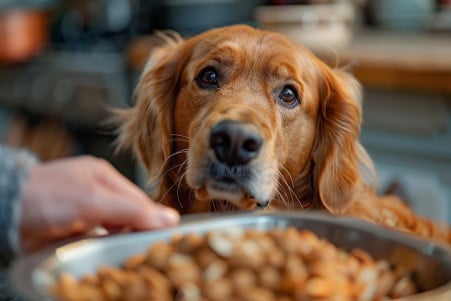Can Dogs Eat Hazelnuts? A Comprehensive Guide
2 May 2024 • Updated 2 May 2024

While hazelnuts can make a delicious snack for your dog, there are some important things to know about the potential dangers and best practices for feeding your dog this type of nut. Hazelnuts are not poisonous to dogs, but their high fat content can lead to pancreatitis and obesity if consumed in large amounts. Hazelnuts also have shells that can be a choking hazard and cause blockages in your dog's digestive system if not prepared correctly. As a result, hazelnuts should be fed to dogs in moderation as an occasional treat.
In this article, we'll cover information from veterinarians and scientific research to give you a complete picture of the safety concerns, nutritional content, and recommended feeding practices for hazelnuts in your dog's diet. Armed with this information, you'll be able to decide whether or not to give your dog this popular nut in a way that ensures you're looking out for their health and safety.
Can dogs eat hazelnuts?
Choking and Obstruction Risks: How to Keep Your Dog Safe Around Hazelnuts
The size and shape of hazelnuts make them a choking hazard, especially for smaller dogs or dogs that tend to swallow their food whole. As The Dog People by Rover.com explains, "Hazelnuts pose a choking hazard to smaller dogs, so be sure to monitor your dog if he does get his paws on a few."
Even if your dog doesn't choke on a hazelnut, swallowing one whole can lead to an intestinal obstruction. This is a life-threatening condition that PetMD says "may lead to serious digestive issues." Symptoms of an obstruction include vomiting, straining to defecate, diarrhea, loss of appetite, and abdominal pain.
To reduce the chances of either of these things happening, it's important to always remove the shells from hazelnuts and break them into smaller pieces before giving them to your dog. Petcube explains that "dogs can eat hazelnuts, in theory" but they can also be a "dangerous choking hazard and can get stuck in their intestines and cause significant problems" if they aren't prepared properly. It's also important to make sure your dog is chewing the hazelnuts properly, which you can do by watching them closely while they eat them. If your dog starts to choke or shows signs of an obstruction, such as coughing, gagging, vomiting, or abdominal pain, take them to the vet right away, as these are potentially life-threatening emergencies.
Pancreatitis and Obesity: Watching Your Dog's Hazelnut Consumption
Hazelnuts are high in fat, which can lead to pancreatitis, a condition that occurs when the pancreas becomes inflamed. As MasterClass notes, "Hazelnuts are high in fat, which can cause pancreatitis in dogs if eaten excessively." Pancreatitis can lead to vomiting, diarrhea, loss of appetite, and abdominal pain in dogs and may require medical attention.
In addition, overconsumption of hazelnuts can also lead to obesity in dogs, which Purina explains "can have a negative effect on your dog's health." Obesity can also lead to other health problems like diabetes and joint issues.
To avoid these problems, VetCBD Hemp suggests that "hazelnuts should be given as an occasional treat in small quantities, and should not make up a significant portion of a dog's diet." It's also important to keep an eye on a dog's weight and adjust their overall caloric intake as needed when feeding them hazelnuts or other high-fat treats.
Hazelnut-Based Products: What to Watch Out For
Hazelnut-based products like hazelnut butter or Nutella may also contain other ingredients that are toxic to dogs, such as chocolate or artificial sweeteners like xylitol. As noted by The Honest Kitchen, "Before you give your dog even a taste of any nut butter, read the label carefully. Xylitol, an artificial sweetener that is often added to commercially available butters, is dangerous for dogs to eat."
Chocolate, which is an ingredient in Nutella, is toxic to dogs and can cause symptoms that range from vomiting and diarrhea to seizures and even death, depending on the amount ingested. As noted by Dogster, "Nutella is considered toxic for dogs because it contains chocolate. Although it does not contain that much cocoa (7.4%), the risk of adverse effects depends on several factors, the most crucial one being the size of your dog."
Xylitol is also extremely toxic to dogs and can lead to hypoglycemia, liver failure, and death. Oakhurst Veterinary Hospital notes that "Xylitol is found in several products, from pastries to nut butters, toothpaste to chewing gum. It's a chemically derived sweetener used in many sugar-free items. Unfortunately, it is also found in nut butters. This toxin is very poisonous to dogs and causes kidney failure, among other serious symptoms."
If you do feed your dog hazelnut-based products, it is important to make sure to check the ingredient list and avoid any products that contain chocolate, xylitol, or other potentially harmful ingredients. While plain hazelnut butter without added sweeteners or chocolate may be a safer option, it should still be fed in moderation due to its high fat content.
Other Nuts to Consider and Moderation Tips
Although hazelnuts can be fed to dogs in moderation, Pawlicy Advisor explains that there are other nuts that may be safer and more practical for regular consumption. Peanuts and peanut butter (as long as it doesn't contain any sweeteners like xylitol) are safe for dogs and can even be a good source of protein and healthy fats, according to Purina.
Cashews and pistachios can also be fed to dogs in small amounts, but they should be unsalted and unshelled to prevent any potential digestive or choking issues, as Harmony Animal Hospital points out. However, macadamia nuts, walnuts, and almonds are toxic or can cause gastrointestinal problems in dogs and should be avoided.
No matter what type of nut you're feeding your dog, Daily Paws stresses that it's important to do so in moderation, and that nuts should only be a small part of a dog's diet to avoid weight gain and other health problems. With this in mind, and by being aware of the risks and opting for safer nut options, dog owners can treat their pets to nuts every once in a while in a way that's safe and responsible.
Signs and Treatment of Hazelnut Overconsumption
If your dog eats too many hazelnuts or hazelnut-based products, it's important to know the signs of hazelnut overconsumption and how to treat the problem. According to VetCBD Hemp, signs of hazelnut overconsumption include vomiting, diarrhea, abdominal pain, lethargy, and loss of appetite.
In more serious cases, PetMD notes that pancreatitis or intestinal obstructions can develop, which will require immediate veterinary care and treatment. If a dog has eaten a toxic amount of hazelnuts or hazelnut-based products that contain chocolate or xylitol, it's important to call a veterinarian or animal poison control center right away, according to Puppy Tales.
It's important to make sure that your dog is closely monitored and receives professional medical care if they have eaten too many hazelnuts to avoid any serious health issues, according to The Dog People by Rover.com.
Conclusion: How to Safely Feed Hazelnuts to Dogs
Hazelnuts are not toxic to dogs, but they should be treated with caution due to their potential hazards. Hazelnuts can be a choking hazard for dogs due to their size and hard shell. They can also cause digestive upset if consumed in large amounts, leading to symptoms like vomiting, diarrhea, and stomach pain. In addition, hazelnuts are high in fat, which can lead to pancreatitis in dogs if they are consumed in large amounts.
Unsalted hazelnuts can be given to a dog that's curious about their owner's favorite snack. However, like any other type of nut, they should be given in moderation and not too frequently, as this can have a negative impact on your dog's health. As with most other nuts, pancreatitis, obesity and choking are the biggest risks to keep in mind.
As with all things in life, moderation is key. Only give nuts with extreme care, and be sure to monitor your pet in case they choke on a nut. DO NOT give your pet too many nuts, even if they are on this 'safe list.' It can lead to stomach upset with possible vomiting and diarrhea, as well as pancreatitis. By understanding the risks and following responsible feeding guidelines, dog owners can safely and responsibly include hazelnuts in their dog's diet.


